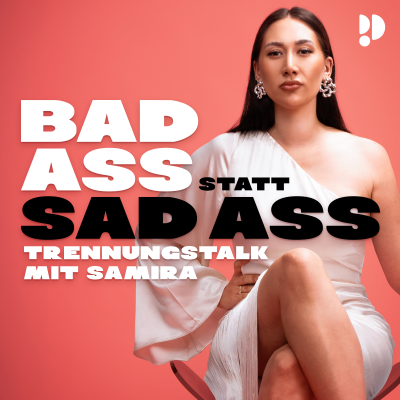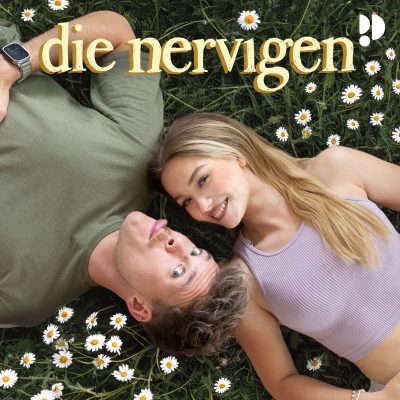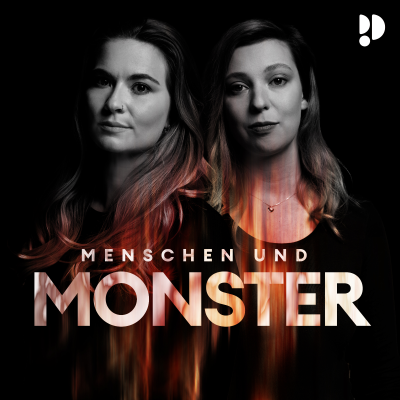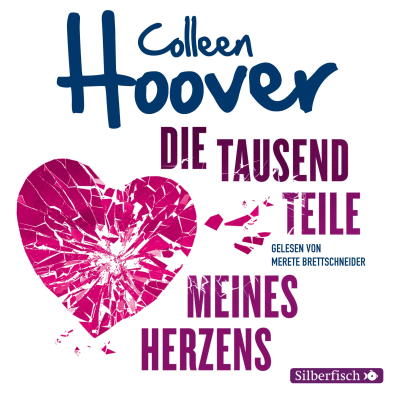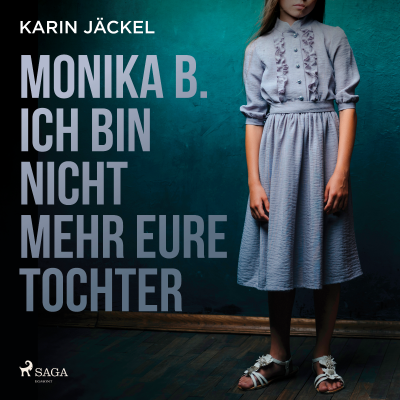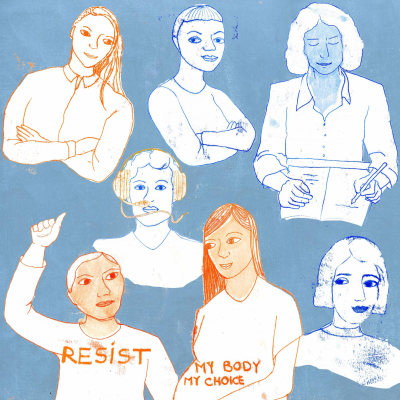
Our Voices, Our Choices
Podcast von Heinrich-Böll-Stiftung
This series hands the microphone to people whose voices don’t often get heard - people now making choices which don’t conform to laws or customs - or whose views have long been disregarded, even censored. Its about communities fighting for basic human rights and its about the diverse tools of their struggles. We discover how women are securing their rights through political protest, we look in detail at women’s reproductive rights and we go into LGBT communities worldwide.
Kostenlos testen für 30 Tage
Nach der Testphase nur 4,99 € / Monat.Jederzeit kündbar.
Alle Folgen
24 FolgenIn the fourth episode of the series »Feminism and War,« Berlin migrants share their commitment to achieving a gender-just peace. Their efforts extend beyond Germany, influencing communities as far away as Colombia, Ukraine, Russia, and Japan. They serve as interviewers in the Colombian peace process, showcase stories from Ukrainian and Russian exile communities and bring the memory of sexualised violence against women worldwide into public spaces in Germany. Through their dedication, they not only help to reevaluate the impacts of past wars but also work towards preventing future conflicts. However, this form of political engagement is not universally accepted. A podcast with: * Nataly Jung-Hwa Han, Chairwoman of the Korea Association e.V. * Claudia Tribin, coordinator at Xochicuicatl e.V. * Olga and Viktoria, directors of Playback Theatre Links: Museum of the so-called »comfort women« [https://trostfrauen.museum/] Koreaverband [https://koreaverband.de/trostfrauen/] Truth Commission of the Colombian Peace Process [https://www.comisiondelaverdad.co/] Website of the Xochicuicatl association [https://www.xochicuicatl.de/language/de/home/] »Faces of Peace« exhibition [https://www.forumzfd.de/de/gesichter-des-friedens]
Transnational feminist solidarities are currently under pressure. The growing anti-gender movement is restricting feminist work and queer rights. Additionally, differing – and in some cases irreconcilable – views on the war in Gaza are creating further divisions. In both cases, the pressure also has a financial dimension: feminist actors who publicly express criticism risk losing funding. This episode of the series »Feminism and War« focuses on the growing disillusionment with the promise of a feminist German foreign policy. It also explores new civil society alliances that could complement existing ones. A podcast with: * Xenia Kellner, co-founder of Young Feminist Europe * Erix Cortés, Institutional Learning and Philanthropic Advocacy Coordinator at the Urgent Action Fund Latin America & the Caribbean * Anika Flensburg, Head of Advocacy and Press at the Swedish women's rights organisation Kvinna till Kvinna Links: Background on the debate surrounding the terms »antisemitism«, »apartheid«, »genocide« and »Zionism« [https://heimatkunde.boell.de/de/2024/09/26/eine-einordnung-der-debatten-um-die-begriffe-antisemitismus-apartheid-genozid-und] International reactions to the case of the cancelled funding for the Egyptian NGO CEWLA [https://www.madamasr.com/en/2023/12/07/news/u/germany-cuts-funding-to-egyptian-womens-rights-organization-for-criticizing-israel/] Engagement of the »Urgent Action Fund for Feminist Activism« in Palestine and Lebanon [https://urgentactionfund.org/2024/11/05/from-genocide-to-liberation-supporting-feminist-activists-in-palestine-and-lebanon/] Dossier and articles on feminist foreign policy [https://eu.boell.org/en/feminist-foreign-policy] PISSY podcast on solidarity [https://pissy.podigee.io/25-new-episode]
Reproductive violence is a targeted strategy in warfare that impacts women and individuals of childbearing age. This includes forced sterilization, forced pregnancy, rape, and the destruction of medical infrastructure. Despite international agreements such as the UN Convention on the Elimination of All Forms of Discrimination against Women (CEDAW) and the Rome Statute, the prosecution of such crimes remains infrequent. When the bodies of women giving birth become a part of the battlefield in war, it raises significant questions about their safety and rights. To better protect women during childbirth from reproductive violence, we need to address these issues comprehensively. This topic is explored in episode 2. A podcast with: * Anika Flensburg, Head of Advocacy and Press at the Swedish women's rights organisation »Kvinna till Kvinna« * Dania Gharaibeh, Head of the Global Gender and Inclusion Unit at CARE International * Anja Bezold, midwife with Médecins Sans Frontières Links: Kvinna till Kvinna [https://kvinnatillkvinna.org/] CARE International [https://www.care.org/] Médecins Sans Frontières [https://www.msf.org/] Policy brief from Kvinna till Kvinna on reproductive violence in Gaza [https://kvinnatillkvinna.org/publications/obstetric-reproductive-maternal-violence-in-gaza/] UN special rapporteur Reem Alsalam on reproductive violence in palestine [https://www.aa.com.tr/en/middle-east/un-rapporteur-calls-for-investigation-end-to-many-layers-of-violence-against-palestinian-women/3158936] »The Womb as a Weapon in Palestine« from the Friedrich-Ebert-Stiftung [https://feminism-mena.fes.de/e/the-womb-as-a-weapon-in-palestine.html] taz article on medical care for pregnant women in Gaza [https://taz.de/Medizinische-Versorgung-im-Gazastreifen/!6013658/]
Sudan, Syria, former Yugoslavia and currently Israel and Gaza: sexualised violence in conflicts is prohibited by international law and yet it occurs again and again. It affects millions of women and girls. The causes are deeply rooted in patriarchal social systems. The long-term consequences of sexualised violence are serious for the survivors concerned. In most cases, the perpetrators do not have to answer to court, and their actions remain without consequence. This podcast episode shows how sexualised violence can destroy entire societies and why a feminist view of war is essential for sustainable peace. A podcast with: * Franziska Ulm-Düsterhöft, Africa consultant at Amnesty International Germany * Monika Hauser, founder of the human rights organisation ‘Medica Mondiale’ * Maya Lecker, deputy editor-in-chief of the Israeli newspaper ’Haaretz English’ Links: Article on sexualised violence against women and girls in Sudan [https://www.unfpa.org/news/sexual-violence-and-conflict-sudan-war-bodies-women-and-girls] Info page from medica mondiale on sexualised violence in conflicts [https://medicamondiale.org/gewalt-gegen-frauen/sexualisierte-kriegsgewalt] Study by medica mondiale on the long-term effects of sexualised violence in Kosovo [https://medicamondiale.org/gewalt-gegen-frauen/aktuelles/neue-studie-zu-den-langzeitfolgen-sexualisierter-kriegsgewalt-in-kosovo] Report of the UN Special Representative Pramila Patten on sexualised violence in Israel and during the subsequent conflict on 7 October [https://www.un.org/sexualviolenceinconflict/wp-content/uploads/2024/03/report/mission-report-official-visit-of-the-office-of-the-srsg-svc-to-israel-and-the-occupied-west-bank-29-january-14-february-2024/20240304-Israel-oWB-CRSV-report.pdf] Controversial New York Times article on sexualised violence by Hamas on 7 October [https://www.nytimes.com/2023/12/28/world/middleeast/oct-7-attacks-hamas-israel-sexual-violence.html] Article by Palestinian feminist activist Samah Salaime on 7 October [https://www.rosalux.org.il/artikel/die-feministische-befreiungsbewegung-darf-sich-nicht-vom-krieg-spalten-lassen/]
Join us for the grand finale of our 3-part series, where we shift our focus to feminist leadership on an individual level. This episode explores the personal challenges faced by those in leadership positions who strive to lead differently. Our journey begins with Helene, co-founder of Fair Share of Women Leaders, and continues with Vandita Morarka, CEO of One Future Collective. Vandita reveals the internal struggles and guilt that can accompany feminist leadership but offers a refreshing perspective on how to navigate them. Their stories showcase the incredible courage and compassion it takes to be a feminist leader, illuminating the path towards a more equitable future for all. A podcast with: • Helene Wolf, Co-Founder and Co-Director of Fair Share of Women Leaders • Vandita Morarka, Founder and CEO of One Future Collective Links: Video with Vandita Morarka talking about Feminist Leadership [https://feministleadership.org/2023/03/27/meet-vandita-morarka/] More about “Fair Share of Women Leaders [https://fairsharewl.org/about-us/]” Downloads and more info about Feminist Leadership [https://www.boell.de/en/feminist-leadership] Article about Collective Feminist Leadership [https://www.boell.de/en/2021/10/29/collective-feminist-leadership-unlearning-me-me-me] Videos and Materials about Feminist Leadership [https://fairsharewl.org/feministleadership/#:~:text=Feminist%20Leadership%20at%20its%20most,structures%20on%20the%20collective%20level.] More About the organisation We Are Feminist Leaders and its Feminist Leadership Programme [https://www.wearefeministleaders.com/about-we-are-feminist-leaders] More about the Feminist Hiking Collective [https://feministhikingcollective.org/]
Kostenlos testen für 30 Tage
Nach der Testphase nur 4,99 € / Monat.Jederzeit kündbar.
Exklusive Podcasts
Werbefrei
Alle frei verfügbaren Podcasts
Hörbücher
20 Stunden / Monat



